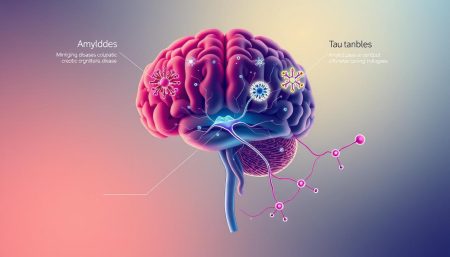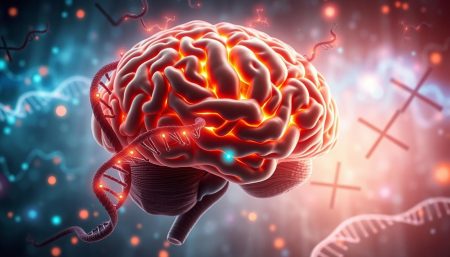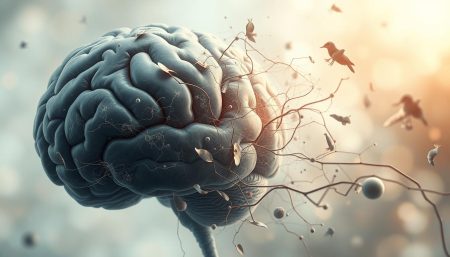Alzheimer’s disease is a major cause of dementia worldwide, affecting millions of lives. It leads to cognitive impairment and neurodegeneration. Yet, knowing its causes offers hope to many.
Many factors contribute to Alzheimer’s, from genetic predispositions to lifestyle choices. The medical field is making progress, finding new treatment options for those affected.
The battle against Alzheimer’s shows the strength of the human spirit. It sets the stage for strategies that help patients and caregivers.
Key Takeaways
- Alzheimer’s disease is at the forefront of cognitive disorders causing dementia.
- Identifying causes is critical, spanning from genetics to daily health habits.
- Emerging treatment options offer hope and support for affected individuals.
- Pioneering research and patient-centered care are vital in managing Alzheimer’s.
- Information with empathy is essential for the well-being of patients and caregivers.
What is Alzheimer’s Disease?
Alzheimer’s disease is a big challenge in mental health. It causes dementia and a drop in thinking skills. It’s a brain disease that makes memory and thinking worse, affecting daily life and happiness.
Defining Dementia and its Most Common Form
Dementia is a term for many symptoms of brain decline. Alzheimer’s is the main type, making up 60-80% of cases. It makes it hard for people to do things on their own because of memory loss and thinking problems.
Neurodegeneration and Cognitive Impairment
Alzheimer’s is known for brain cell loss. This loss affects thinking, making simple tasks hard. People often get confused, struggle with money, and forget faces and places.
Looking at how Alzheimer’s affects people, we see big challenges in daily life. It changes a person’s identity and how they connect with others. It’s not just memory loss but a deep change in who they are.
Early Signs and Symptoms of Alzheimer’s Disease
Spotting the early signs of Alzheimer’s is key to managing the disease well. The first signs often include small memory and thinking changes. These can start with simple forgetfulness and grow into serious memory loss that affects daily life.
Cognitive impairment is a major sign. People may find it hard to solve problems or think clearly. They might struggle with tasks they used to do easily at work or home. Also, behavioral changes are important. These can include mood swings and changes in personality, confusing loved ones.
Acting fast when these signs appear can make a big difference. It can help keep life quality high for longer.
Here are some examples of cognitive impairments and behavioral changes:
- Asking the same questions over and over, unable to remember new things.
- Having trouble planning or solving problems, like following recipes or managing bills.
- Getting confused about dates and times, or losing track of the seasons.
- Stepping back from activities they once enjoyed, like work or social events.
To better understand early symptoms, here’s a comparison of typical age-related changes and early Alzheimer’s signs:
| Common Age-Related Changes | Early Signs of Alzheimer’s |
|---|---|
| Occasionally forgetting names or appointments | Forgetting recently learned information or important dates |
| Making a bad decision once in a while | Difficulty making decisions, poor judgment leading to bad decisions frequently |
| Sometimes forgetting which word to use | Regular difficulty finding the right words, problems following or joining a conversation |
| Changes in mood in response to an appropriate cause | Mood and personality changes occurring without apparent cause, including confusion, suspicion, and depression |
Matching symptoms with these signs can prompt a visit to the doctor. This can lead to an early diagnosis and possible treatment plans. Knowing about these behavioral changes and memory loss helps people and their families get help quickly.
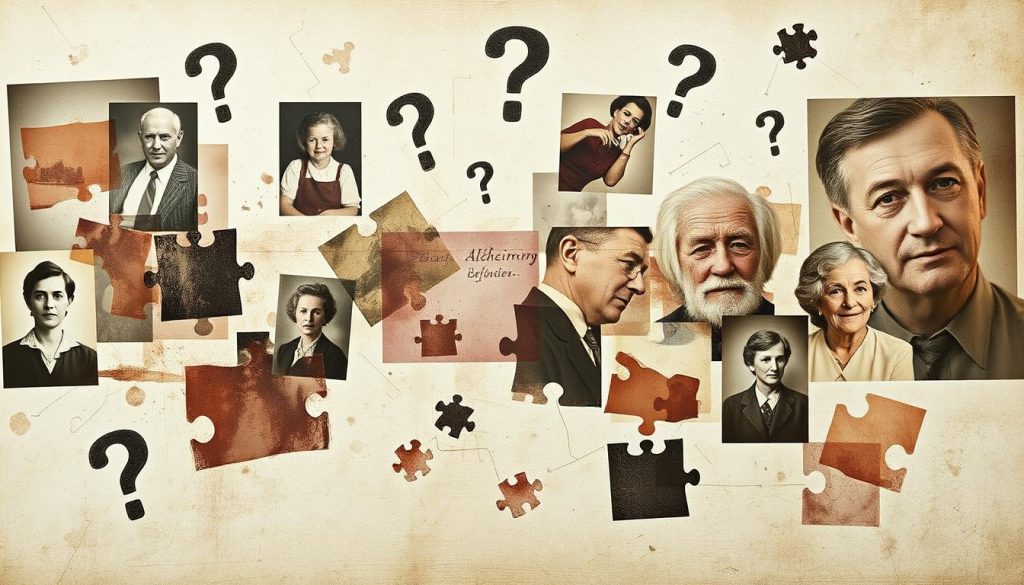
Alzheimer’s Disease vs. Normal Aging
It’s key to know the difference between Alzheimer’s disease and normal aging to catch and manage cognitive health issues early. While both can cause memory problems, the type and impact are quite different.
Distinguishing Between Forgetfulness and Memory Loss
Forgetfulness in normal aging is usually harmless, like losing keys or forgetting appointments. But, memory loss from Alzheimer’s is much deeper, affecting daily life. Spotting these signs early can make a big difference, as explained on Washington University Physicians’ website.
Behavioral Changes and Cognitive Decline
The move from normal aging to Alzheimer’s disease shows up in behavioral changes and quick cognitive decline. These signs are more than just getting older. They can make it hard to talk, solve problems, and keep emotions in check.
| Aspect | Normal Aging | Alzheimer’s Disease |
|---|---|---|
| Memory Lapses | Occasional, minor | Frequent, severe |
| Behavioral Changes | Mild personality shifts | Significant, often distressing changes |
| Cognitive Abilities | Slow, minor decline | Rapid decline, loss of function |
This comparison shows why it’s vital to tell normal aging apart from Alzheimer’s symptoms. Being informed and watchful is crucial. It helps in taking steps that can change the disease’s course.
The Science Behind Alzheimer’s: Amyloid Plaques and Tau Proteins
Understanding Alzheimer’s disease shows a complex battle between amyloid plaques and tau proteins. These are key to neurodegeneration, the main cause of Alzheimer’s. This part looks at how these proteins build up in the brain and affect our brain health.
Amyloid plaques are thick, hard clumps of protein and cell parts that form around brain cells. They are mainly made of beta-amyloid, a sticky stuff that messes with brain signals, harms cell work, and causes inflammation. This leads to brain damage and neurodegeneration.
Tau proteins help keep the brain’s microtubules working right. These are important for brain cell function and getting nutrients. But in Alzheimer’s, tau proteins go wrong and form tangles in neurons. This blocks the cell’s transport system, leading to cell death.
The fight between amyloid plaques and tau proteins is key in Alzheimer’s research. It shows how the disease gets worse through brain damage. The damage starts with amyloid plaques, then tau tangles, ending in severe brain loss seen in Alzheimer’s patients.
Knowing how amyloid plaques and tau proteins work in Alzheimer’s helps scientists find new treatments to slow or stop brain damage.
The table below shows how amyloid plaques and tau proteins cause Alzheimer’s disease:
| Amyloid Plaques | Tau Proteins |
|---|---|
| Accumulate outside neurons | Form tangles inside neurons |
| Disrupt cellular communication | Impair nutrient transport |
| Promote inflammatory responses | Lead to neuronal death |
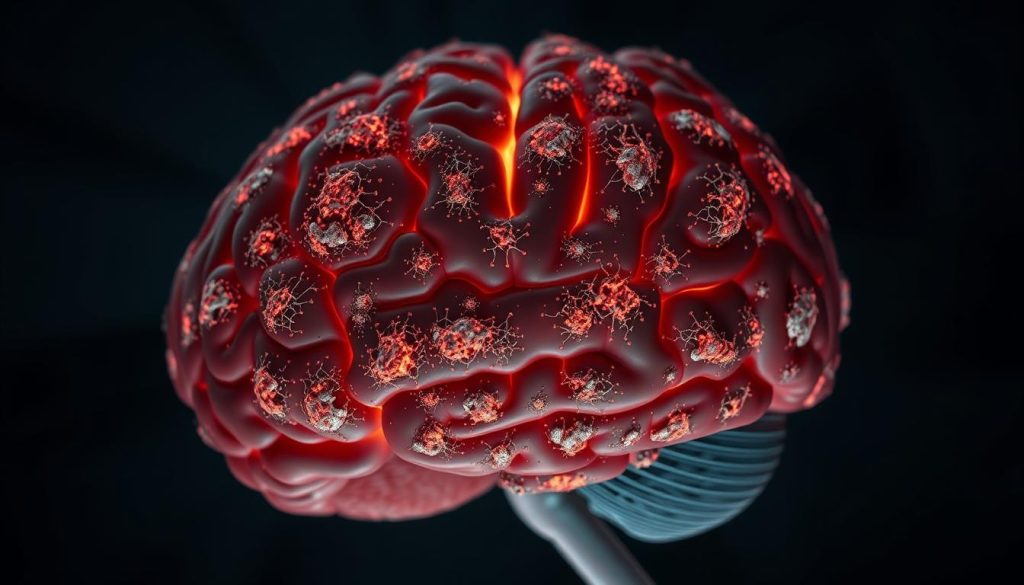
Research is working on new drugs to remove amyloid plaques and fix tau proteins. This could change how Alzheimer’s disease is treated. By stopping these proteins, we might prevent or slow brain damage and memory loss.
In summary, the battle of amyloid plaques and tau proteins is at the heart of Alzheimer’s research. It offers ways to make big medical breakthroughs in treating the disease.
Genetic and Lifestyle Risk Factors for Alzheimer’s Disease
Exploring Alzheimer’s disease shows us the importance of genetic mutations and lifestyle contributions. Knowing these risk factors helps us make better health choices.
Inherited Genetic Mutations
Studies have found certain genetic mutations that raise the risk of Alzheimer’s. These mutations affect genes that control brain function and growth. For instance, changes in APP, PSEN1, or PSEN2 genes are linked to early-onset Alzheimer’s.
Family history is key here. If a family member has Alzheimer’s, you’re more likely to get it too. This is because these mutations are passed down through genes.
Environmental and Lifestyle Contributions
Genetics and environment together shape Alzheimer’s risk. Lifestyle choices, like diet and exercise, can greatly affect your risk. Eating foods rich in antioxidants and staying active can help.
On the other hand, pollution and chemicals can increase your risk. It’s important to avoid these and live a healthy lifestyle.
| Risk Factor | Impact | Preventative Measures |
|---|---|---|
| Genetic Predisposition | High impact in early-onset cases | Genetic counseling and testing |
| Poor Diet | Increases oxidative stress and inflammation | Antioxidant-rich diet, low in processed foods |
| Physical Inactivity | Decreases blood flow to the brain | Regular cardiovascular and strength exercises |
| Environmental Toxins | Contributes to cognitive decline | Minimize exposure, use protective gear if necessary |
Understanding and changing these risk factors helps prevent Alzheimer’s. It also leads to a healthier lifestyle that supports brain health.
Examining the Stages of Alzheimer’s Disease
Understanding Alzheimer’s involves seeing how symptoms start and get worse. This is key for patients, families, and caregivers. It helps them prepare for what’s coming.
Alzheimer’s is divided into three main stages: mild, moderate, and severe. Each stage shows more signs of memory loss. These signs make it harder for people to do things on their own.
“Alzheimer’s progresses uniquely in each individual, but understanding the common progression can provide comfort and readiness,” notes a leading neurologist.
- Early Stage: Symptoms are often mild and can be different for everyone. Early signs might include forgetting things, getting lost in familiar places, and changes in personality and judgment.
- Middle Stage: Symptoms are more obvious. People may struggle with daily tasks, have big memory problems, and need help because of safety and behavior issues.
- Late Stage: People may not be able to talk clearly and need constant help with personal care. They might not recognize family members, and their physical skills will greatly decline.

| Stage | Symptoms | Required Care Level |
|---|---|---|
| Mild | Memory lapses, mood swings, trouble with complex tasks. | Minimal supervision; assistance with challenging tasks. |
| Moderate | Increase in memory loss, confusion, difficulty recognizing close friends and family. | Moderate supervision; help with daily activities and safe environment maintenance. |
| Severe | Significant loss of cognitive abilities and physical functions; minimal awareness of environment. | Comprehensive 24-hour care, focusing on comfort and dignity. |
Going through Alzheimer’s needs a careful plan that changes as the disease gets worse. The emotional toll on those affected is huge. But knowing these changes helps in giving loving and effective care.
Alzheimer’s Disease: Diagnostic Tests and Assessments
Diagnosing Alzheimer’s disease requires a mix of diagnostic tests for Alzheimer’s and dementia assessments. These tools help tell Alzheimer’s apart from other dementias. They also measure how much cognitive impairment evaluation is present. Getting a diagnosis early is key to managing the disease well.
Doctors use many tools to spot Alzheimer’s. These tools check how well the brain works and its structure. Here are some main ways doctors figure out if someone has Alzheimer’s:
- Neuropsychological Tests
- Neuroimaging Techniques
- Genetic Testing
Below is a table comparing common neuroimaging methods for diagnosing Alzheimer’s:
| Technique | Focus Area | Benefits | Limits |
|---|---|---|---|
| MRI (Magnetic Resonance Imaging) | Brain structure | High-resolution images, no radiation | May not detect early signs |
| CT (Computed Tomography) | Brain structure | Quick, widely available | Less detailed than MRI |
| PET (Positron Emission Tomography) | Brain activity | Can measure metabolic changes | Expensive, involves radiation |
| SPECT (Single Photon Emission Computed Tomography) | Blood flow in the brain | Useful in differentiating types of dementia | Lower resolution than PET |
Doctors also talk to neurologists and watch how the brain works over time. If someone notices memory or thinking problems, they should see a doctor. These could be signs of Alzheimer’s or other dementias.
Conventional Treatment Options for Alzheimer’s
Alzheimer’s disease is a big challenge for doctors around the world. It’s important to know about treatment options for Alzheimer’s for both patients and doctors. Pharmacological treatments are key in managing symptoms and slowing the disease’s progress.
Pharmacological Approach to Treatment
Pharmacological therapies are at the heart of Alzheimer’s treatment. They help with cognitive and behavioral symptoms. These medicines don’t cure Alzheimer’s but improve life quality.
Medicines like Donepezil, Galantamine, and Rivastigmine are used in early to middle stages. For moderate to severe stages, Memantine is prescribed. These drugs help keep neurotransmitter levels in the brain, aiding nerve communication and reducing symptoms.
Benefits of Early Intervention
The early intervention benefits in Alzheimer’s are huge. They help both the patient and the healthcare system. Starting treatment early can slow down cognitive decline.
This approach keeps patients independent longer. It also eases the load on caregivers and healthcare facilities.

Starting treatment soon after diagnosis is a crucial step in managing Alzheimer’s. Early intervention can lessen symptoms’ impact. This makes managing the disease clearer.
Exploring Alternative Therapies in Alzheimer’s Care
There’s a growing interest in alternative therapies for Alzheimer’s to improve patient care. These therapies mix old and new methods to tackle the disease’s symptoms. A big focus is on diet and nutrition and brain exercises to manage Alzheimer’s.
Role of Diet and Nutrition
Diet and nutrition are key in managing Alzheimer’s. They help with both physical and mental health. Foods that fight inflammation and boost brain health are recommended.
- Leafy greens like spinach and kale
- Berries, especially blueberries and strawberries
- Fatty fish such as salmon and mackerel
- Nuts like almonds and walnuts
These foods can reduce stress and inflammation in the brain. They might help slow down cognitive decline.
Lifestyle Modifications and Brain Exercises
Changing your lifestyle and doing brain exercises are also important. These activities keep the brain sharp and can be fun.
- Puzzle-solving activities like crosswords or Sudoku
- Memory games that enhance recall abilities
- Learning new skills such as a musical instrument or a new language
These activities boost brain function and improve life quality. They make us feel good and help our brains stay flexible.
In summary, alternative therapies for Alzheimer’s like good diet and nutrition and brain exercises are promising. They support both physical and mental health in managing Alzheimer’s.
Understanding and Supporting the Role of Caregivers
The role of caregivers in managing Alzheimer’s disease is vital. They face a journey filled with emotional commitment and demanding tasks. It’s important to recognize their role and provide the support they need.
Challenges of Caregiving for Someone with Alzheimer’s
Caregivers deal with many challenges, from emotional to physical. Watching a loved one decline is emotionally tough. They also face practical issues like managing medication and ensuring safety. Physical exhaustion is common due to the constant caregiving demands.
Resources and Support Systems for Caregivers
Fortunately, many resources are available to help caregivers. Local and national organizations offer advice, respite care, and educational materials. These resources can greatly help caregivers manage stress and take care of themselves.
| Resource | Type of Support | Contact Information |
|---|---|---|
| Alzheimer’s Association | Educational materials and support groups | 1-800-272-3900 |
| Family Caregiver Alliance | Respite care and grant opportunities | 1-800-445-8106 |
| Local Senior Centers | Day care programs and support services | Varies by location |
Advancements in Alzheimer’s Research for Future Treatments
The world of Alzheimer’s research is always changing. New advancements in Alzheimer’s research are bringing hope for better treatments. This section looks at the latest breakthroughs and new ways to fight Alzheimer’s, offering a glimmer of hope.
One exciting area is finding biomarkers for early detection. Catching Alzheimer’s early could change treatment forever. It would let doctors start helping patients before brain damage gets worse.
- Targeted Therapies: New medicines aim to tackle the brain’s abnormal protein build-ups seen in Alzheimer’s.
- Gene Therapy: Scientists are looking into gene editing, like CRISPR, to change genes linked to Alzheimer’s.
- Vaccine Development: Work on an Alzheimer’s vaccine is moving forward, with some early trials showing promise.
There’s also a push for a more complete approach to managing symptoms. This includes lifestyle changes, cognitive therapies, and personalized medicine. Each plan is made just for the person, taking into account their genes and lifestyle.
These advancements in Alzheimer’s research are leading to new future treatments. They’re also helping us understand the disease better. The progress in dementia research is inspiring everyone, giving us hope for beating this tough condition.
Living with Alzheimer’s: Quality of Life and Patient Care
Keeping a quality of life for those with Alzheimer’s requires hard work in patient care and making daily changes. This part talks about how families and caregivers can keep dignity and comfort for those with this disease.
Lifestyle Adaptations: Making the home safe and easy to get around is key. This means putting in grab bars, removing rugs, and making sure there’s enough light. Also, keeping routines simple and consistent helps a lot.
- Adaptive utensils and dinnerware for easier handling during meals.
- Labels and signs on cabinets and doors to help navigate the living spaces.
- Technology assistance like GPS devices and automated home systems that ensure safety and control.
Emotional and Social Engagement: Getting involved in simple, fun activities can really improve quality of life. Things like art therapy, music sessions, and safe outings are great for keeping someone engaged and happy.
Scheduled Respite Care: Giving caregivers regular breaks is very important. Professional respite services help a lot. They prevent burnout and make the home a happier place.

It’s also important to celebrate small wins every day. When patients remember something, enjoy an activity, or show they know someone, it lifts everyone’s spirits.
Even with the tough challenges of living with Alzheimer’s, we can make a big difference. By focusing on quality of life and patient care, we can manage the disease better. This way, we also keep the dignity and respect of those affected.
The Global Impact of Alzheimer’s Disease
Alzheimer’s disease has a huge impact worldwide, touching millions each year. It affects not just those diagnosed but also healthcare systems and societies. Understanding it well is key to lessening its effects.
Statistical Overview and Future Projections
Right now, Alzheimer’s affects over 50 million people globally. As more people age, this number is expected to jump to over 152 million by 2050. This shows a big increase in dementia cases, highlighting the need for better global health plans.
Impact on Healthcare Systems and Societies
Alzheimer’s has a wide impact, affecting economies, healthcare, and life quality. It costs a lot, with expenses expected to hit over $2 trillion by 2030.
Healthcare systems struggle to keep up with the demand for care and the complexity of treatments. The costs go beyond medical expenses, affecting workforces and productivity. Family members often take on caregiving duties, adding to the strain.
| Year | Global Cases (millions) | Healthcare Costs (USD) |
|---|---|---|
| 2020 | 50 | $305 billion |
| 2030 | 76 | $2 trillion |
| 2050 | 152 | Estimated to increase significantly |
Conclusion
As we explore Alzheimer’s disease, we find hope in new treatments and support. Our guide has shown us the path for patients, caregivers, and doctors. Together, we aim to understand and manage this condition better.
We discussed how genetics, behavior, and global impact shape Alzheimer’s. Our goal is to educate and support those touched by dementia. We focus on making medical info easy to understand and offering emotional support.
We urge you to join the fight against Alzheimer’s. Get involved in Alzheimer’s communities, push for more research, share your experiences, and support those in need. Together, we can face Alzheimer’s with courage and unity.
FAQ
Q: What causes Alzheimer’s disease?
A: Alzheimer’s disease comes from a mix of genetics, environment, and lifestyle. It’s marked by amyloid plaques and tau proteins in the brain. These cause brain damage and memory loss.
Q: What are the early signs and symptoms of Alzheimer’s disease?
A: Early signs include memory loss and trouble solving problems. You might also forget familiar tasks or get confused about time and place. Mood and personality changes are also common.
Q: How is Alzheimer’s disease different from normal aging?
A: Normal aging might cause small memory changes. But Alzheimer’s leads to big memory loss and cognitive decline. It also causes behavioral changes that affect daily life.
Q: What is the role of amyloid plaques and tau proteins in Alzheimer’s?
A: Amyloid plaques and tau proteins are key in Alzheimer’s. Plaques are protein deposits between nerve cells. Tau proteins form tangles inside nerve cells. Together, they harm brain function.
Q: What are the risk factors for Alzheimer’s disease?
A: Risk factors include age and family history. Genetically inherited mutations and certain genetic markers also play a role. Cardiovascular health, head trauma, and lifestyle choices like smoking are also factors.
Q: How does Alzheimer’s disease progress through its stages?
A: Alzheimer’s starts with no symptoms, then moves to mild cognitive impairment. It progresses to mild, moderate, and severe dementia. This impacts communication and independence.
Q: What diagnostic tests and assessments are there for Alzheimer’s?
A: Diagnostics include cognitive tests and brain imaging. MRI and PET scans are used. Biomarker tests also identify brain changes linked to Alzheimer’s.
Q: What are the current treatment options for Alzheimer’s?
A: Treatments include medications like cholinesterase inhibitors. Non-pharmacological treatments and lifestyle changes are also important. They help manage symptoms and improve quality of life.
Q: Can diet and alternative therapies help with Alzheimer’s?
A: Diets like the Mediterranean diet and cognitive exercises can help. Alternative therapies should support conventional treatments. Always discuss them with healthcare providers.
Q: What resources and support are available for Alzheimer’s caregivers?
A: Caregivers can find support groups, counseling, and respite care. Educational materials and help from organizations like the Alzheimer’s Association are also available.
Q: How can I maintain quality of life if I or a loved one is living with Alzheimer’s?
A: Keep a healthy lifestyle and adapt your living space. Stay socially active and have a strong support network. These steps can improve life with Alzheimer’s.
Q: What research is being done to find future treatments for Alzheimer’s?
A: Research is ongoing, exploring gene therapy and vaccines. Drugs to reduce brain inflammation are also being studied. Clinical trials look into lifestyle interventions to prevent cognitive decline.
Q: What is the global impact of Alzheimer’s disease?
A: Alzheimer’s affects millions worldwide, straining healthcare systems. It has big economic and social impacts due to care needs and lost productivity.













